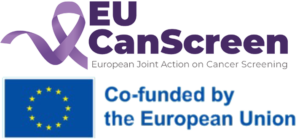Work Package 4:
Sustainability
WP 4
Sustainability


OIL, Slovenia, co-led by DoH, Ireland
Work Package Summary
The overall objective is to ensure sustainable implementation of project results in participating countries and to improve sustainable implementation of organised, population-based cancer screening programmes in countries of the European region where such programmes are not yet implemented or are implemented in a way that is not yielding the expected impact.
Specific objectives are as follows:
1) To develop the tools and guidelines for assessment of sustainability of cancer screening programmes;
2) To develop robust and context-specific governance models for cancer screening;
3) To consolidate existing guidelines and tools for barrier assessment and solutions for overcoming the barriers;
4) To develop methodology and guidelines for prioritisation of cancer screening/prevention;
5) To develop a strategy for the sustainable European networking of cancer screening programmes and key decision makers;
6) To empower EUCanScreen participants to use project results in sustainable and impactful way.
OIL, Slovenia,
co-led by DoH, Ireland
Tasks
| Task Nr | Task Name | Description | Participants |
| T4.1 | Situational analysis regarding the sustainability of screening in participating countries | The task entails 3 sub-tasks: 4.1.1. Overview of the current knowledge and tools on sustainability and governance in cancer screening. 4.1.2. Development of a protocol and survey to assess sustainability of screening. 4.1.3. Pilot assessment of the screening sustainability in all participating countries. This task will be led by OIL, Slovenia, co-led by AUSLRE, Italy, and IARC. | LU OI L, DoH IE, ISPRO, PHC, NIPH, PMSI IO AUSLRE, CPO, CSF, EMC, NCI, IU NAMSU |
| T4.2 | Development of contextspecific governance models for cancer screening in Europe | The task comprises 2 sub-tasks: 4.2.1. Update of CANCON theoretical governance model, including assessment of governance structures in participating countries; findings of the literature review (subtask 4.1.1) and the feedback from sub-task 4.2.2. 4.2.2. Co-creation of robust governance models for West, South, North and Central and Eastern European region. Cocreation of context-specific governance models in exemplary countries. Lessons learned in this task will be used to develop governance leadership training in Task 11.1. This task will be led by CSF, Finland, co-led by IARC. | LU DoH IE, OIL, ISPRO, SoS, MoH SK, NIPH, TAI, NKIP, PHC, UZIS, CSF, EMC, IU NAMSU, DYPEDE, NOI, NNGYK, NCI, MINSAL, NIJZ, |
| T4.3 | Review of existing methodologies and tools for barrier assessment and linking them together in a meaningful way | The task comprises 2 sub-tasks: 4.3.1 Development of the European barrier assessment guidelines and tools for cancer screening, including the review of existing tools and guidelines. Consolidation of existing tools in terms of scope and comprehensiveness and assessment of usability with pilot field experience. 4.3.2 Pilot testing of guidelines and tools. This task will be led by LoR, Italy, co-led by IARC. | LU DoH IE, OIL, ISPRO, NIPH, MoH SK, TAI, NKIP, PHC, RSYD LoR, CSF, EMC, NOI, NNGYK, NCI, IU NAMSU, PAT, OUS, DYPEDE |
| T4.4 | Development of methodology for prioritisation in cancer screening/prevention | This task will entail activities organised within the following subtasks: 4.4.1 Situation analysis of prioritisation in cancer screening. 4.4.2 Development of a framework for prioritisation of cancer screening programs. 4.4.3 Pilot testing of prioritisation framework in exemplary countries to assess the feasibility, acceptability and comprehensibility of the prioritisation framework. 4.4.4 Validation and transferability of the MAS-AI tool for AI assessment in healthcare and expansion of the tool to novel screening based on the EUnetHTA core model, specifically to evaluate AI interventions. This task will be led by EMC, Netherlands, co-led by CPO Turin, Italy; CSF, Finland; and RSYD, Denmark. | RSYD EMC, CPO, CSF, All CA |
| T4.5 | Establishment of a sustainable European cancer screening network and engagement of Governmental Advisory Board (GAB) | The task will consist of activities organised within the following subtasks: 4.5.1. Cancer screening Governance Advisory Board (GAB). 4.5.2. Engagement of European stakeholders to improve sustainable implementation of cancer screening programs in the European region. 4.5.3. Strategy for the European Cancer Screening Network (ECSN) will be prepared to ensure sustainable networking of cancer screening stakeholders in the WHO European Region beyond EUCAnScreen. This task will be led by OIL, Slovenia, co-led by LU, Latvia, ECL and IARC | |
| T4.6 | Cancer screening sustainability workshops | 4.6.1 One-day face-to-face sustainability workshops will be organised in Lyon, joined with 2-day leadership training (Task 11.1). 4.6.2 One-day face-to-face sustainability workshops will be organised in Brussels, joined with 2-day leadership training (Task 11.1). These workshops are aimed to present, discuss and test the tools and approaches developed in other tasks of this WP and in collaboration with WP6 and WP10, with a broader audience. These workshops are not meant to provide logistical support for technical workshops planned in other tasks of this WP. 4.6.3 Development of learning web-platform for WP11 virtual trainings. This task will be led by OIL, Slovenia, co-led by ECL and IARC. | OIL, DoH IE All CA |
| Task Nr | Task Name | Description | Participants | Role | In-kind Contributions/Subcontracting |
| T4.1 | Situational analysis regarding the sustainability of screening in participating countries | The task entails 3 sub-tasks: 4.1.1. Overview of the current knowledge and tools on sustainability and governance in cancer screening. 4.1.2. Development of a protocol and survey to assess sustainability of screening. 4.1.3. Pilot assessment of the screening sustainability in all participating countries. This task will be led by OIL, Slovenia, co-led by AUSLRE, Italy, and IARC. | LU OI L, DoH IE, ISPRO, PHC, NIPH, PMSI IO AUSLRE, CPO, CSF, EMC, NCI, IU NAMSU | COO BEN AE | Yes (subcontracting) |
| T4.2 | Development of contextspecific governance models for cancer screening in Europe | The task comprises 2 sub-tasks: 4.2.1. Update of CANCON theoretical governance model, including assessment of governance structures in participating countries; findings of the literature review (subtask 4.1.1) and the feedback from sub-task 4.2.2. 4.2.2. Co-creation of robust governance models for West, South, North and Central and Eastern European region. Cocreation of context-specific governance models in exemplary countries. Lessons learned in this task will be used to develop governance leadership training in Task 11.1. This task will be led by CSF, Finland, co-led by IARC. | LU DoH IE, OIL, ISPRO, SoS, MoH SK, NIPH, TAI, NKIP, PHC, UZIS, CSF, EMC, IU NAMSU, DYPEDE, NOI, NNGYK, NCI, MINSAL, NIJZ, | COO BEN AE | Yes (subcontracting) |
| T4.3 | Review of existing methodologies and tools for barrier assessment and linking them together in a meaningful way | The task comprises 2 sub-tasks: 4.3.1 Development of the European barrier assessment guidelines and tools for cancer screening, including the review of existing tools and guidelines. Consolidation of existing tools in terms of scope and comprehensiveness and assessment of usability with pilot field experience. 4.3.2 Pilot testing of guidelines and tools. This task will be led by LoR, Italy, co-led by IARC. | LU DoH IE, OIL, ISPRO, NIPH, MoH SK, TAI, NKIP, PHC, RSYD LoR, CSF, EMC, NOI, NNGYK, NCI, IU NAMSU, PAT, OUS, DYPEDE | COO BEN AE | Yes (subcontracting) |
| T4.4 | Development of methodology for prioritisation in cancer screening/prevention | This task will entail activities organised within the following subtasks: 4.4.1 Situation analysis of prioritisation in cancer screening. 4.4.2 Development of a framework for prioritisation of cancer screening programs. 4.4.3 Pilot testing of prioritisation framework in exemplary countries to assess the feasibility, acceptability and comprehensibility of the prioritisation framework. 4.4.4 Validation and transferability of the MAS-AI tool for AI assessment in healthcare and expansion of the tool to novel screening based on the EUnetHTA core model, specifically to evaluate AI interventions. This task will be led by EMC, Netherlands, co-led by CPO Turin, Italy; CSF, Finland; and RSYD, Denmark. | RSYD EMC, CPO, CSF, All CA | BEN AE COO, BEN, AE | Yes (subcontracting) |
| T4.5 | Establishment of a sustainable European cancer screening network and engagement of Governmental Advisory Board (GAB) | The task will consist of activities organised within the following subtasks: 4.5.1. Cancer screening Governance Advisory Board (GAB). 4.5.2. Engagement of European stakeholders to improve sustainable implementation of cancer screening programs in the European region. 4.5.3. Strategy for the European Cancer Screening Network (ECSN) will be prepared to ensure sustainable networking of cancer screening stakeholders in the WHO European Region beyond EUCAnScreen. This task will be led by OIL, Slovenia, co-led by LU, Latvia, ECL and IARC | LU OI L All CA | COO BEN BEN, AE | Yes (subcontracting) |
| T4.6 | Cancer screening sustainability workshops | 4.6.1 One-day face-to-face sustainability workshops will be organised in Lyon, joined with 2-day leadership training (Task 11.1). 4.6.2 One-day face-to-face sustainability workshops will be organised in Brussels, joined with 2-day leadership training (Task 11.1). These workshops are aimed to present, discuss and test the tools and approaches developed in other tasks of this WP and in collaboration with WP6 and WP10, with a broader audience. These workshops are not meant to provide logistical support for technical workshops planned in other tasks of this WP. 4.6.3 Development of learning web-platform for WP11 virtual trainings. This task will be led by OIL, Slovenia, co-led by ECL and IARC. | OIL, DoH IE All CA | BEN COO, BEN, AE | Yes (subcontracting) |
Subscribe to our newsletter to get news and updates.
Subscribe to our newsletter to get news and updates.

The general objective of EUCanScreen is to assure sustainable implementation of high-quality screening for breast, cervical and colorectal cancers, as well as implementation of the recently recommended screening programs – for lung, prostate and gastric cancers. EUCanScreen will facilitate the reduction of cancer burden and achieving equity across the EU.
This project has received funding from the European Union’s EU4HEALTH Programme under the Grant Agreement no 101162959











